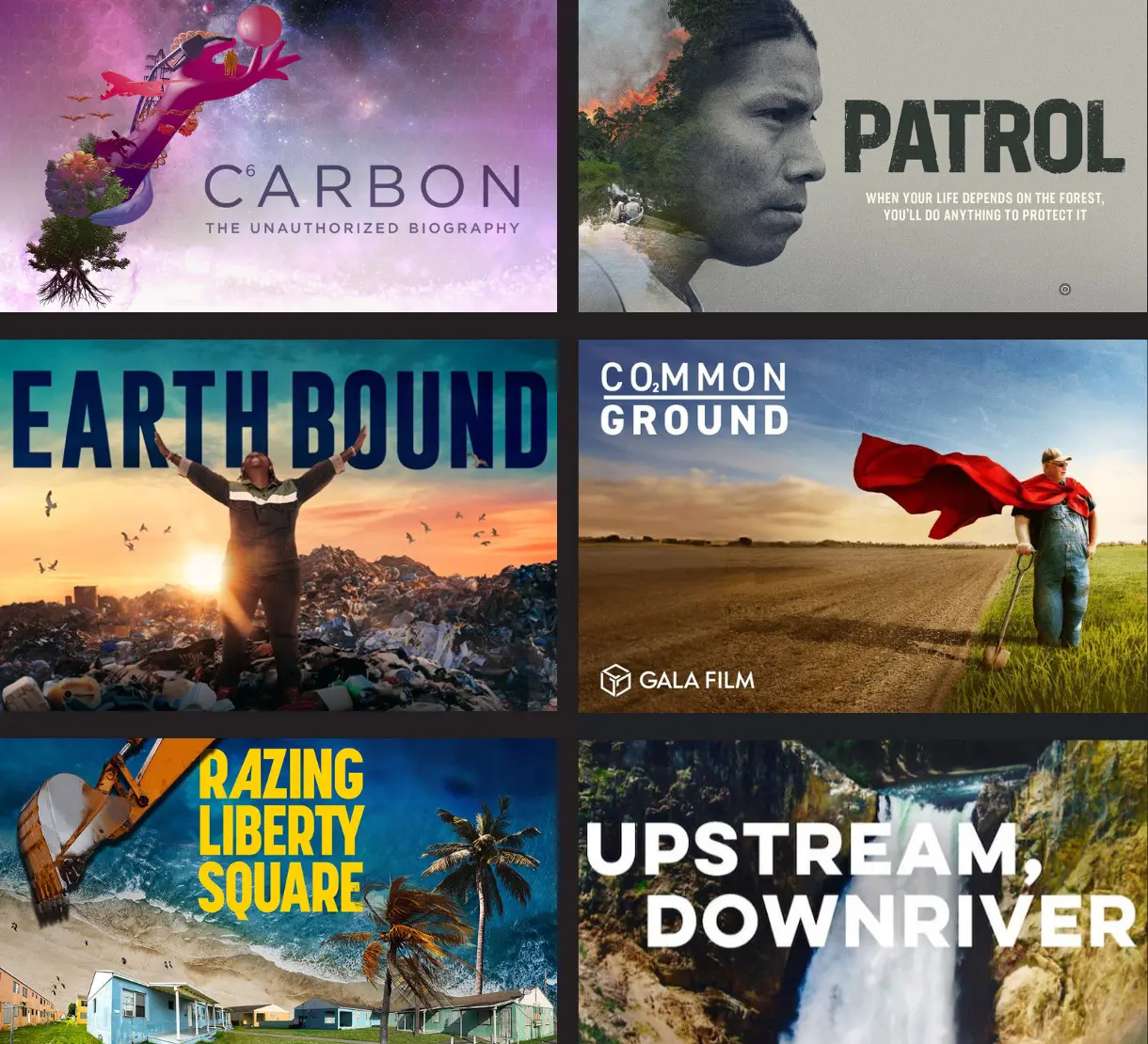At Chicago’s Environmental Film Festival, moviegoers were treated to an impactful documentaries and panels about water and climate justice.
| All products featured on The Wellness Feed are independently selected by our editors for their environmental and ethical impact. However, when you buy something through our retail links, we may earn an affiliate commission. |

I recently got to tap into my inner cinephile and attend Chicago’s One Earth Film Festival. This week-long environmental film fest consisted of numerous film screenings across the Chicagoland area, virtual watch parties, action fairs, and panel discussions. The impactful film festival was put on by One Earth Collective, a non profit offering environmental programming that inspires collective action, educates individuals and communities, and promotes justice.
I had the pleasure of attending Thursday’s screenings, which centered around water justice. The screenings took place at Epiphany Center for the Arts in West Chicago, a space where activists, community members, artists, and film goers all gathered to engage in meaningful conversation before the screenings began. When I arrived, live music filled the air, as well as a sense of excitement. Ana Garcia Doyle, the One Earth Film Festival director and founding member, kicked off the event with a brief speech before the films began rolling. Over the next few hours I learned about disparities in access to clean water, water sanitation issues, the importance of clean water in communities, and how to take action to help promote water justice.
THE FILMS
The Island by Mahmut Taş
This impactful short film addresses climate change and its impact on access to water. The story follows four-year-old Ada, a child living in a now barren village in Turkey that once contained a grand lake and plenty of clean drinking water. Mahmut’s decision to tell the story through the eyes of a young child is powerful and shows how even the youngest members of society are impacted by water justice and feel the effects of a lack of access to water.
This film’s visuals also leave viewers feeling stunned, as the camera pans over the dried up land that was once a thriving lake. The ending image in particular stuck with me, as a drone camera zoomed out and all you can see for miles is dried up desert land.
Submerged by Neo Sky James
Another moving short film shown at the festival was “Submerged,” directed by Neo Sky James. Neo won One Earth Film Festival’s Young Filmmakers Contest in 2023 with this animated film focused on the importance of keeping our lakes, oceans, and bodies of water clean and free of pollution. In this film, a boy dreams of swimming through a beautiful ocean filled with sea creatures, plant life, and clear blue waters. The dream soon turns to a nightmare, however, when this picturesque oceanscape becomes filled with human-made pollution like garbage and debris. The ending scene features the boy going online to search for beach cleanups near him. This film definitely left me feeling inspired to find beach and nature cleanup programs in my neighborhood.
Upstream, Downriver by Maggie Burnette Stogner
Maggie Burnette Stogner, Executive Director of the Center for Environmental Filmmaking at American University, shared her water justice documentary Upstream, Downriver at this film festival as well. Powerful stories, interviews with changemakers, background on environmental laws such as the Clean Water Act, and footage of American cities and towns affected by polluted water made up this compelling film.
I was particularly enthralled by the section of the documentary focused on the Mobile Bay Watershed in Alabama. The water sanitation issues these communities face is unjust and inhumane. The water is polluted with arsenic, mercury, and radium, and residents also struggle with failing septic systems and polluted water coming back up through their pipes. The interviews with residents and alarming video footage stuck with me long after the screening ended. While covering distressing topics, the documentary maintained an air of hope and optimism, emphasizing the message that access to clean water and sanitation is a human right that we must fight for.
Wings of Dust by Giorgio Ghiotto
The final film of the evening was Wings of Dust, the story of Peruvian activist and journalist Vidal Merma and his fight for a future with clean drinking water. Standing up to environmental injustice, the film follows Merma’s fight to shed light on the dangers of extractive mining and the damage this mining does to the community. It was appalling to hear the physical ailments many of the residents of Espinar, Peru, obtained due to these harmful mining practices. Led, arsenic, and mercury were all found in the blood of indigenous people in the area. The unsafe drinking water was also linked to neurological damage among children and those exposed to the river water. Government control and police repression were also addressed in this film, and it was baffling to see the lengths the government goes to to silence Merma and activists like him. Despite all these grueling challenges, however, Merma continues to fight for water justice and a future where his son can enjoy clean drinking water. This desire and drive to create a better future is truly inspiring.
POST-FILM PANEL ON WATER JUSTICE

After all four films concluded, Vincent Gomez, Director of Community Engagement at the Lincoln Park Zoo, facilitated a discussion on water justice with directors Maggie Burnette Stogner, Mahmut Taş, and Neo Sky James, as well as Sierra Club Clean Water Advocate and Chicago News Weekly Staff Writer Mila Marshall. One of the initial topics discussed was how access to healthy and clean water is an issue all over the world. Director Mahmut Taş weighed in on the question “In terms of helping other countries struggling with access to clean water, what can we do from the US?” Educating people and making them aware of these water issues was one response, followed by the mantra that even seemingly small acts are powerful and can bring about change.
The Clean Water Act was another point of conversation, particularly how this act was a good starting point but there is so much more we have to do in terms of protecting water sources and providing clean water to all communities. All panelists agreed that a sense of urgency to create new water policies is vital.
Lastly, the panelists addressed barriers to community participation in terms of fighting for water justice. Mila Marshall cited that some urban communities have water issues that differ from those environmentalists are focusing on, such as flooded basements and the inability to pay water bills. The intense and often confusing vocabulary surrounding conversations on water issues also alienates certain members of the community. It was mentioned that the media plays a big part in educating the public, and there needs to be more conversations on water justice.
TAKEAWAYS
As I called my Lyft home from the festival, I felt inspired and optimistic. While these films addressed heavy topics, each left me feeling hopeful rather than hopeless. Here are the main takeaways I obtained from this event:
Access to clean and healthy water is a human right, but many communities all over the world do not have access.
From countries across the globe to neighboring communities near our own homes, the amount of people who do not have access to healthy water is alarming! Clean water and sanitation is a human right that we must fight for.
We need updated water policies
Upstream, Downriver specifically mentioned how the Clean Water Act of 1972 changed the relationship between the polluter and the government, making it unlawful to dispose of pollutants into US waters. However, this act does not do a good job of regulating runoff, which is one of the largest sources of water pollution. While this act was a step in the right direction, it is time for updated water policies.
Take action!
Above all else, One Earth Film Festival seeks to inspire people to take action to help protect and restore our planet! This collection of films specifically calls for viewers to step up and fight for water justice.
- A good first step is to search for beach and water cleanups in your area. Use the Ocean Conservancy’s Coastal Cleanup Map to find beach cleanup programs near you.
- Another way to get more involved in the fight for safe water is to improve your civic literacy skills and brush up on current environmental and water laws to understand where improvements are needed.
- Joining local environmental organizations is another approach. We are stronger when we come together as a community to fight for water justice.
- Share what you learn with others! Engage friends and family in meaningful conversations about the importance of access to safe water, share information on social media, and speak with people in your community.
- Write letters to the editors of local publications and ask them to print articles about water issues and water injustices in your community.





